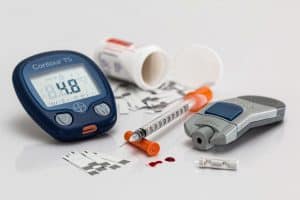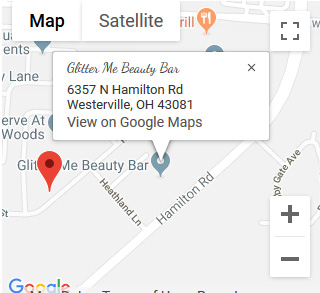One of the most dangerous myths that people believe about their health is that the mouth is separate from the rest of the body. We can understand why this is the case since oral healthcare is traditionally separated from the rest of the body by the distinction between dentistry and medicine. It is often mistakenly assumed that one has no influence on the other.
Not only do dental problems have an effect on your overall health. There are certain health problems that leave signs in the oral cavity that your dentist may be the first to notice! This blog will discuss the most noteworthy health problems that your dentist could catch before your medical doctor does.
- Diabetes
 Diabetes affects millions of Americans, and millions more are pre-diabetic. This disease causes changes in various areas of the body, and the mouth is one of them. Uncontrolled blood sugar leads to a constriction of blood vessels in the extremities, and the gum tissue is an extremity. This reduces the amount of blood, and therefore the vital nutrients that blood brings, to the gums.
Diabetes affects millions of Americans, and millions more are pre-diabetic. This disease causes changes in various areas of the body, and the mouth is one of them. Uncontrolled blood sugar leads to a constriction of blood vessels in the extremities, and the gum tissue is an extremity. This reduces the amount of blood, and therefore the vital nutrients that blood brings, to the gums.
Patients with diabetes, whether they know it or not, suffer from gum disease that does not respond well to traditional dental treatments. Gum tissues that would normally bleed to show a sign of the developing disease simply shrink and recede, making it a “silent” disease. Your dentist or dental hygienist will notice these changes in your gum tissues and point them out to you.
Diabetes also affects the salivary glands, reducing their output, so that most diabetic patients have a dry mouth. Having a dry mouth predisposes patients to more plaque buildup, which leads to an increased risk for both cavities and gum disease. When your dentist suspects that the dangerous changes in your oral cavity are due to uncontrolled blood sugar, he or she will refer you to your medical doctor or an endocrinologist for treatment.
- Acid Reflux or GERD
Acid reflux usually causes symptoms of heartburn, so most people know they have it. Some, however, ignore the symptoms, calling it a normal consequence of overeating. In addition to the damage of this strong stomach acid on the esophagus, which causes the pain of heartburn, the acid also causes erosion of tooth enamel. Someone who suffers from chronic GERD will show ever-thinning enamel. This makes the teeth look shorter and more yellow.
The changes caused by chronic acid exposure in the mouth are obvious! Your dentist will definitely want to know what has changed to allow such damaging consequences on your enamel. When GERD is the likely culprit, your dentist will refer you to your medical doctor or a GI specialist for treatment.
- Sleep Apnea
 Sleep apnea is a breathing disorder in which people stop breathing during sleep. Sometimes patients with sleep apnea snore or make choking or gasping sounds while they sleep. Often, the cause is airway obstruction. One of the body’s natural reflexes to airway obstruction is to push the lower jaw forward in an attempt to open the airway and allow oxygen to enter the lungs, bloodstream and then brain. This forward motion typically results in a grinding of the front teeth.
Sleep apnea is a breathing disorder in which people stop breathing during sleep. Sometimes patients with sleep apnea snore or make choking or gasping sounds while they sleep. Often, the cause is airway obstruction. One of the body’s natural reflexes to airway obstruction is to push the lower jaw forward in an attempt to open the airway and allow oxygen to enter the lungs, bloodstream and then brain. This forward motion typically results in a grinding of the front teeth.
Over time, this grinding produces a shortening of the front teeth, which is a condition called attrition. When your dentist notices attrition, he or she will begin investigating the causes. Sleep apnea, being very common, is at the top of the list of possible diagnoses.
While a dental nightguard may protect the teeth, it will not treat the sleep breathing problem. So your dentist is likely to refer you to your medical doctor or a sleep physician for treatment of the apnea itself.
- Nutritional Deficiencies
 A person’s diet has a large impact on his or her overall health. In order to stay healthy and have well-functioning organs and tissues, you must eat a diet that contains a balance of proteins, fats, vitamins and minerals. Because the tissues lining the inside of the mouth change or “turnover” relatively quickly, they show signs of changes in nutrition. Someone suffering from a nutritional deficiency may have a red, swollen or burning tongue. Painful mouth sores and ulcers also point to a compromised immune system, usually resulting from a nutrient shortage.
A person’s diet has a large impact on his or her overall health. In order to stay healthy and have well-functioning organs and tissues, you must eat a diet that contains a balance of proteins, fats, vitamins and minerals. Because the tissues lining the inside of the mouth change or “turnover” relatively quickly, they show signs of changes in nutrition. Someone suffering from a nutritional deficiency may have a red, swollen or burning tongue. Painful mouth sores and ulcers also point to a compromised immune system, usually resulting from a nutrient shortage.
Speak to your dentist if you notice these types of problems occurring more frequently. If he or she suspects a nutritional deficiency, you will be referred to a medical doctor for bloodwork and nutritional counseling.
More Questions about how your Overall Health shows Signs in the Mouth?
Schedule a comprehensive evaluation with one of our thorough and caring dentists. We can help you understand the connection between your oral health and your overall health!


Comments are closed.